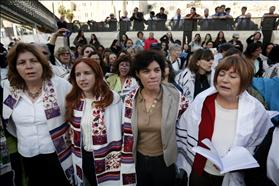A step towards true equality
Women of the Wall's historic decision will reshape the future of the Western Wall
The decision to move Women of the Wall's prayer space from the women's area of the Western Wall to an egalitarian area will end this conflict and allow the Israeli government to approach the religion and state crisis in a more thorough manner.
08/10/2013 18:39
Tags: Women of the Wall · Sharansky Plan · Western Wall ·

MKs Stav Shafir (Labor), and Tamar Zandberg (Meretz) participate in a prayer service with Women of the Wall. From the right side: Head of Women of the Wall, Anat Hoffman. Photo: Miriam Alster/Flash90
Hiddush CEO Rabbi Uri Regev expressed his backing of Women of the Wall's announcement to agree to move to an egalitarian prayer space under specific conditions. "Hiddush supports Women of the Wall's historic decision which will grant them an active role in determining the future of the Western Wall Plaza. This will end one of the most significant conflicts which represent the injustice that the religious establishment, backed by the Israeli government, commits against world Jewry's largest denominations and gender equality."
In an announcement released by Women of the Wall's Executive board, the group agreed to support a plan which includes three equally-sized prayer areas for men, women, and egalitarian worship. The new area will be under the jurisdiction of a pluralistic committee, unlike the current situation in which the Western Wall Heritage Foundation, an ultra-Orthodox organization, governs the site.
Women of the Wall Chairwoman Anat Hoffman said, “We are not leaving the women’s section right now and we reserve the right to prayer freely as a public holy site. However, we are prepared to be the catalyst and leaders of building a new, equal third section for all Jews to pray and celebrate at the Western Wall. When that is completed to our satisfaction, we will pray there." This decision comes after decades of legal battles and violent confrontations at the Western Wall Plaza, including many arrests of the organization's leadership and prayer participants.
"Now that a proper outline for ending the conflict at the Western Wall is agreed upon, the time has come to find solutions to larger problems, which have been put on hold for too long."
According to Regev, "Women of the Wall's decision represents the urgent need to implement the Sharansky Initiative, which strives to create a new Western Wall Plaza that recognizes the character of the Jewish people in 2013. As we know, however, the devil is in the details; the ability to carry out the Sharansky plan will undoubtedly present a challenge to all parties involved, especially considering the potential confrontations with archeologists and the Muslim Waqf authority."
Over the past year the controversy over religious freedom and equality at the Western Wall has received international media and political attention. Prayer services included Knesset members and the paratroopers who liberated the Western Wall during the Six-Day War in 1967. Women of the Wall's struggle is representative of the greater conflict between Israel's ultra-Orthodox religious establishment and the majority of Israelis who support freedom of religion and equality.
"Now that a proper outline for ending the conflict at the Western Wall is agreed upon, the time has come to find solutions to larger problems, which have been put on hold for too long." Rabbi Regev commented, "Today's greatest problem is Israel's marriage crisis, which impacts gender equality and the status of all Jewish denominations in Israel and around the world on a much greater scale. The lack of marriage freedom in Israel threatens Israel's immigrant communities, secular Israelis, and even Israeli Jews who are all forced under the authority of Israel's religious establishment who continuously violate Israelis' fundamental right to raise a family."